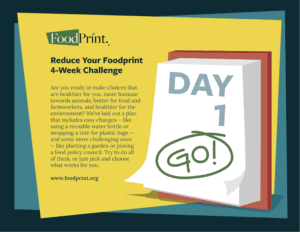This 4-Week Challenge Will Help You Reduce Your FoodPrint

What if this year, your resolution was about something bigger than yourself? You’ve been wanting to do something about climate change (other than bite your fingernails and worry). You’ve been meaning to make changes to your daily routine that would create less food waste and less trash. That’s where our 4-week Reduce Your FoodPrint challenge comes in. With our 4-week plan, you can adopt more sustainable food practices and start to reduce your foodprint. These are changes you can make to your routine, your habits, your purchasing — and your advocacy — that are healthier for you, more humane for animals, better for food and farmworkers, and less harmful to the environment.
Even small steps can have a big impact: giving up meat one day a week can reduce your personal consumption by 15 percent. With some planning, such as bringing along a tote bag or focusing on recipes that use stems and leaves, you can cut back on plastic and food waste. Larger changes, like choosing Food Justice Certified or Certified Grassfed labels when grocery shopping, will guarantee you’ll be supporting more humane and sustainable food production.
We’ve designed the plan in a four-week structure so that anyone can start it, anytime they’d like. Go through the steps to gain a fresh perspective and commit to these goals. Suggest the challenge to your coworkers, classmates or friends — moral support can be the encouragement you need to keep going and make new habits stick.
Ready to take the leap, commit to new sustainable food practices, and start reducing your foodprint? Then download the 4-week plan PDF and check off each activity as you work through the next 28 days. Follow us on social media @foodprintorg to get more tips and information about the challenge, and let us know how you are doing by sharing your progress with the hashtag #ReduceYourFoodPrint.
More Reading
The biodiversity crisis is about more than genetics
October 24, 2023
What does the expanding PFAS crisis mean for the food system?
September 12, 2023
Why Heirloom Seeds Matter
August 18, 2023
Small Farmers in Post-Flood New England Are Starting to Rebuild, but Climate Extremes Are Here to Stay
August 17, 2023
Georgia’s Peach Crop Loss Is About More Than Just Fruit
August 7, 2023
Can We Really Eliminate Invasive Species by Eating Them?
July 19, 2023
Learn About the Fight for Values-Based Food Purchasing — and Recommendations From a New Report
July 10, 2023
“Under the Henfluence” Urges Us to See Hens as Complex Beings
May 10, 2023
Regulators May Finally Be Responding To Growing Alarm Over PFAS Contamination
April 11, 2023
The Foodprint of Tea
April 4, 2023
